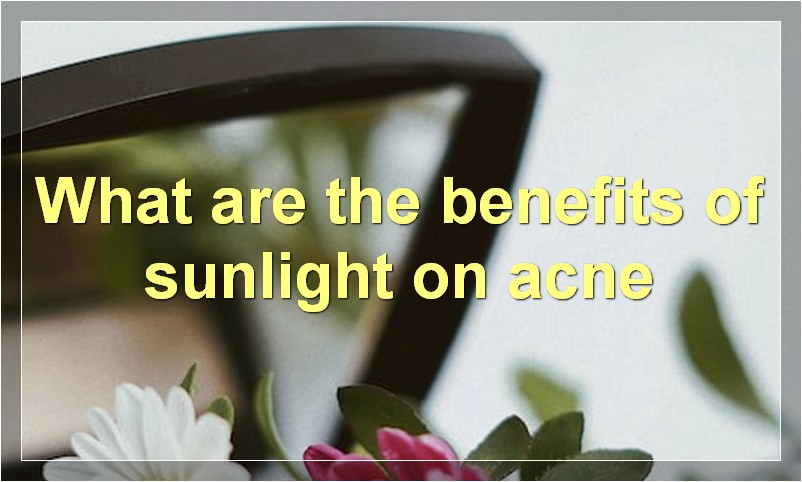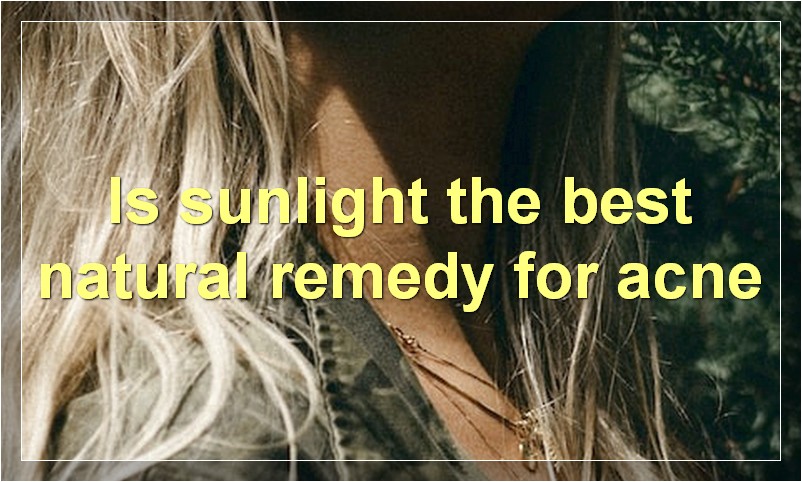There are many myths about what causes acne, but the truth is that there are many factors that can contribute to breakouts. One of the most common triggers is sunlight.
How does sunlight help acne
According to dermatologists, sunlight helps acne in two ways. First, it kills bacteria that cause acne. Second, it reduces inflammation.
sun exposure can help reduce acne by killing the Propionibacterium acnes bacteria that reside deep in the pores of the skin and cause acne. This is because sunlight contains ultraviolet (UV) rays that have antibacterial properties.
Additionally, sunlight can help to reduce acne by reducing inflammation. UV rays help to decrease the production of inflammatory chemicals in the body, such as cytokines. Cytokines are a type of protein that play a role in inflammation.
What are the benefits of sunlight on acne

The sun has been shown to be beneficial in the treatment of acne. Ultraviolet (UV) light from the sun can help kill bacteria that cause acne. It can also help reduce inflammation and redness.
Some research suggests that exposure to sunlight can help improve the appearance of acne by reducing the amount of sebum, or oil, produced by the skin. Less sebum means less of a food source for acne-causing bacteria.
Sunlight exposure can also help dry out pimples and speed up healing. Just be sure not to stay in the sun too long, as this can lead to skin damage and potentially make acne worse.
If you’re looking for a natural way to help treat your acne, spending some time in the sun may be worth a try. Just remember to use sunscreen to protect your skin from harmful UV rays.
How does sunlight kill acne-causing bacteria
Sunlight has ultraviolet (UV) light that can kill acne-causing bacteria. The UV light in sunlight can help to kill the bacteria that cause acne. This is because the UV light damages the DNA of the bacteria. This makes it difficult for the bacteria to reproduce and can eventually lead to the death of the bacteria.
Acne is caused by a build-up of dead skin cells and oil on the skin. Bacteria can also play a role in causing acne. When the pores of the skin become blocked, the bacteria can grow and cause inflammation. Sunlight can help to unblock the pores and kill the bacteria, which can help to clear up acne.
However, it is important to note that too much sun exposure can also damage the skin and lead to other problems, such as sunburn. It is therefore important to use sunscreen when spending time in the sun.
Does sunlight help to dry out pimples
Acne is a common skin condition that affects people of all ages. Though it is often associated with puberty, it can affect people of any age. Acne occurs when the pores of the skin become blocked with oil, dead skin cells, or bacteria. This can cause blackheads, whiteheads, or pimples.
There are many myths about what causes acne. Some people believe that acne is caused by dirt, but this is not true. Acne is not caused by poor hygiene. In fact, over-washing the skin can actually make acne worse.
genetics also plays a role in who gets acne and how severe it is. If someone in your family has had acne, you are more likely to get it.
There are many treatments for acne. Some people use over-the-counter medicines, while others see a dermatologist for prescription medications. Some people also use natural remedies.
One common natural remedy for acne is exposure to sunlight. Sunlight can help to kill the bacteria that cause acne and it can also help to dry out the skin. However, too much sun exposure can lead to skin damage, so it is important to find a balance.
If you are looking for a natural way to treat your acne, sunlight may be worth a try. Just be sure to wear sunscreen and avoid excessive sun exposure.
How long should you spend in the sun to help clear acne
How long should you spend in the sun to help clear acne?
This is a common question asked by many people who are looking for an alternative or natural treatment for acne. The short answer is that there is no one definitive answer to this question. However, we can provide some guidelines based on what dermatologists and research studies recommend.
First, it’s important to understand that acne is caused by a combination of factors, including genetics, hormones, and the inflammation of the skin. While the sun can help to reduce inflammation and kill bacteria, it is not a cure-all for acne. In fact, if you spend too much time in the sun without adequate protection, you may actually end up exacerbating your acne.
That being said, moderate sun exposure can be beneficial for people with acne. Dermatologists typically recommend 20-30 minutes of sun exposure per day, three to four times per week. This exposure should be done during the early morning or late afternoon, when the UV rays are not as strong. It’s also important to wear sunscreen with an SPF of at least 30 to protect your skin from harmful UV rays.
So, how long should you spend in the sun to help clear acne? There is no one definitive answer, but moderate exposure (20-30 minutes per day, three to four times per week) during the early morning or late afternoon is generally recommended by dermatologists. Just be sure to wear sunscreen with an SPF of at least 30 to protect your skin!
Is sunlight the best natural remedy for acne

Acne is a common skin condition that affects people of all ages. Though it is most commonly associated with adolescence, acne can occur at any age. Acne occurs when the pores of the skin become clogged with oil, dead skin cells, or bacteria. The resulting inflammation can lead to redness, swelling, and pimples.
There are many potential treatments for acne, both over-the-counter and prescription. One popular treatment option is sunlight. Sunlight can help to kill the bacteria that cause acne and can also help to reduce inflammation.
While sunlight may be a effective treatment for acne, it is important to remember that too much sun exposure can also be harmful to the skin. It is important to find a balance between getting enough sun exposure to treat acne and not so much sun exposure that the skin becomes damaged.
What are the side effects of using sunlight to treat acne
Sunlight has been shown to be an effective treatment for acne vulgaris, the most common form of acne. However, there are some potential side effects that should be considered before using this treatment option.
Exposure to sunlight can cause skin damage, including sunburn, premature aging, and skin cancer. Therefore, it is important to use sunscreen with a high SPF when spending time outdoors, even if you are only using sunlight to treat your acne.
In addition, some people may experience an increase in acne breakouts when their skin is exposed to sunlight. This is because the ultraviolet light from the sun can trigger inflammation and lead to the formation of new pimples. If this occurs, you may need to use a different acne treatment option or take measures to protect your skin from the sun.
Overall, sunlight can be an effective treatment for acne vulgaris, but it is important to be aware of the potential side effects before using this method. If you have any concerns, be sure to speak with a dermatologist or other healthcare provider.
How often should you expose your skin to sunlight to see results
When it comes to sun exposure and skin, there are a lot of conflicting opinions out there. Some say that the sun is the best thing for your skin, while others claim that too much sun will damage your skin and cause wrinkles. So, how often should you expose your skin to sunlight to see results?
The answer may surprise you, but there is no definitive answer. It really depends on your skin type, how sensitive your skin is to the sun, and what kind of results you are looking for.
If you have sensitive skin, you may want to limit your sun exposure to just a few minutes a day. Alternatively, if you are looking to get a tan or boost your vitamin D levels, you may need to spend more time in the sun.
No matter what your skin type or goals are, it is important to always wear sunscreen when you are exposed to sunlight. This will help protect your skin from harmful UV rays and prevent premature aging.
So, how often should you expose your skin to sunlight? The answer is: it depends. Talk to your dermatologist about what is right for you and always use sunscreen for protection.
Is there anything else you can do to speed up the process of clearing acne with sunlight
Acne is a common skin condition that affects many people, especially teenagers. Although there are many treatments available, some people prefer to use natural remedies. One popular natural remedy for acne is exposure to sunlight.
There are several ways that sunlight can help to clear acne. Sunlight can help to kill the bacteria that cause acne. It can also help to reduce inflammation and redness. Additionally, sunlight can help to dry out the skin, which can reduce the amount of oil that contributes to acne.
If you are considering using sunlight to clear your acne, there are a few things you should keep in mind. First, it is important to avoid sunburn. Second, you will need to expose your skin to sunlight for at least 15 minutes per day. Finally, you may need to be patient as it can take several weeks or even months for sunlight to start clearing your acne.
What precautions should you take when using sunlight to treat acne
Acne is a common skin condition that affects millions of people around the world. While there are many treatments available, some people choose to use sunlight to treat their acne.
There are a few things to keep in mind if you’re thinking about using sunlight to treat your acne. First, it’s important to know that sunlight can actually make acne worse. If you have acne-prone skin, exposure to the sun can trigger breakouts.
Second, while sunlight can help to dry out pimples and promote healing, too much sun exposure can damage the skin and lead to premature aging. It’s important to find a balance between getting enough sun exposure to benefit your acne, and not so much that you cause damage to your skin.
Finally, be sure to wear sunscreen when you’re spending time in the sun, even if you’re just using sunlight to treat your acne. Sunscreen will help protect your skin from harmful UV rays and prevent further damage.
With these things in mind, you can safely use sunlight to treat your acne. Just be sure to take precautions to avoid making your acne worse and damaging your skin in the process.





